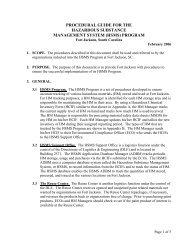All PDF pages for Mark - Fort Jackson - U.S. Army
All PDF pages for Mark - Fort Jackson - U.S. Army
All PDF pages for Mark - Fort Jackson - U.S. Army
Create successful ePaper yourself
Turn your PDF publications into a flip-book with our unique Google optimized e-Paper software.
Capt. David M. Jones<br />
Legal Assistance Attorney<br />
State courts have jurisdiction over matters of child<br />
support, even <strong>for</strong> Soldiers. If a South Carolina family<br />
court has issued an order <strong>for</strong> child support, commanders<br />
cannot override or alter that order.<br />
If parents agree to a specific<br />
amount of support, the courts will<br />
usually go along with that figure<br />
unless it appears to be unfair to the<br />
child. Courts look to several criteria to<br />
determine how much child support a non-custodial<br />
parent will pay.<br />
In South Carolina, family courts look to a schedule of<br />
basic child support obligations to determine an equitable<br />
monthly payment. Child support is not fixed but can<br />
increase or decrease by a subsequent court order if either<br />
party demonstrates a substantial change in circumstances.<br />
The primary consideration used to determine the<br />
monthly child support obligation is the gross income of<br />
both parents. Gross income is defined as income from all<br />
sources to include salaries, wages, commissions, royalties,<br />
bonuses, rents, dividends, severance pay, pensions,<br />
interest, trust income, etc.<br />
In addition, courts consider assets available to generate<br />
income in determining child support. Normally, each<br />
party submits an assessment worksheet whereby he/she<br />
discloses their gross income, as well as other factors<br />
such as additional children, other monthly child support<br />
and/or alimony obligations, the cost of health insurance,<br />
Legal<br />
Determining child support payments<br />
medical expenses and child care costs.<br />
Each party receives credit <strong>for</strong> additional items on the<br />
assessment worksheet. For instance, if either parent has<br />
natural or adopted children living in the home that are<br />
not part of the support agreement (step-children are not<br />
included unless there is court ordered responsibility)<br />
they receive a credit.<br />
A party also receives credit <strong>for</strong> other monthly alimony<br />
or child support payments. These amounts are<br />
deducted from a party’s<br />
gross income. The<br />
actual cost of day<br />
care a parent<br />
incurs<br />
because of<br />
employment<br />
is also credited<br />
in the supportobligation<br />
as long<br />
as that parent<br />
first subtracts<br />
the federal<br />
income tax<br />
credit he/she<br />
receives.<br />
Courts also consider provisions<br />
<strong>for</strong> adequate health insurance coverage in every<br />
child support order. Usually the cost of the health insurance<br />
is deducted from the support payment. Once the<br />
adjusted gross income is determined, the court uses a<br />
Legal Assistance Office<br />
<strong>Fort</strong> <strong>Jackson</strong>’s Legal Assistance Office is located<br />
in the Office of the Staff Judge Advocate, 9475<br />
Kershaw Rd., and is open from 9 a.m. to 4 p.m.,<br />
Monday through Thursday. Appointments can be<br />
made by calling 751-4287.<br />
The office accepts walk-ins <strong>for</strong> living wills, health<br />
care powers of attorney and durable powers of attorney,<br />
1:30-3:30 p.m, Tuesdays and Thursdays.<br />
Walk-ins are welcome <strong>for</strong> general legal questions<br />
and are accepted 1:30-4 p.m., Wednesdays.<br />
chart to determine the total amount of child support<br />
required per month.<br />
The non-custodial parent would pay a percentage of<br />
this figure, based on the ratio of his/her income to the<br />
total adjusted gross income. For example, if the non-custodial<br />
father’s adjusted gross income was 75 percent of<br />
the total adjusted gross income of the parties (i.e. mother<br />
and father’s income combined), the father would pay 75<br />
percent of the support amount from the chart.<br />
Determining the correct support amounts can get<br />
complicated –– it is important to seek competent legal<br />
advice when you are facing separation and divorce.<br />
If you have any questions about child support, please<br />
contact the Legal Assistance Office, located in the Office<br />
of the Staff Judge Advocate, 9475 Kershaw Rd. Hours of<br />
operation are weekdays from 9 a.m. to 4 p.m. To set up<br />
an appointment with an attorney, call 751-4287.














